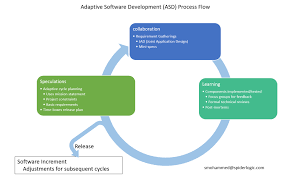Embracing Change: The Power of Adaptive Software Development in Modern Tech Projects
Adaptive Software Development: Adapting to Change in the Digital Age
In today’s fast-paced and ever-changing digital landscape, software development needs to be agile and adaptable. One approach that has gained popularity is Adaptive Software Development (ASD). ASD is a methodology that emphasizes flexibility, collaboration, and continuous improvement throughout the software development process.
Key Principles of Adaptive Software Development:
- Collaboration: ASD promotes close collaboration among team members, stakeholders, and end-users. By working together closely, teams can quickly adapt to changing requirements and feedback.
- Iterative Development: ASD follows an iterative approach, where software is developed in small increments. This allows for early feedback, rapid prototyping, and continuous refinement of the product.
- Continuous Learning: In ASD, learning is a fundamental part of the development process. Teams reflect on their work regularly, identify areas for improvement, and adjust their approach accordingly.
- Flexibility: ASD recognizes that requirements and priorities can change rapidly. Teams are encouraged to embrace change and adjust their plans as needed to deliver value to the customer.
The Benefits of Adaptive Software Development:
Adaptive Software Development offers several advantages for software development teams and organizations:
- Rapid Response to Change: By being adaptable and flexible, teams can respond quickly to changing market conditions, customer needs, or technological advancements.
- Improved Collaboration: Close collaboration among team members fosters creativity, innovation, and a shared sense of ownership over the project.
- Better Quality Products: The iterative nature of ASD allows for early detection of defects and issues, leading to higher-quality software products.
- Enhanced Customer Satisfaction: By involving customers throughout the development process and adapting based on their feedback, ASD helps ensure that the final product meets their expectations.
In Conclusion
In conclusion, Adaptive Software Development is a valuable approach for modern software development projects. By embracing flexibility, collaboration, and continuous learning, teams can deliver high-quality products that meet evolving customer needs in today’s dynamic digital landscape.
Understanding Adaptive Software Development: Key Differences, Methodologies, and Applications in Java
- What is adaptive software development method?
- How does the adaptive software development model differs from the traditional development model?
- What are the seven 7 software development methodologies?
- What is ASD in Java?
What is adaptive software development method?
The Adaptive Software Development method is a flexible and collaborative approach to software development that emphasizes adaptability to change throughout the project lifecycle. It focuses on close collaboration among team members, stakeholders, and end-users, allowing for rapid adjustments in response to evolving requirements and feedback. By following an iterative development process and embracing continuous learning, teams using Adaptive Software Development can deliver high-quality software products that meet the dynamic needs of today’s digital environment.
How does the adaptive software development model differs from the traditional development model?
In the context of software development, the adaptive software development model differs from traditional development models in several key ways. Unlike traditional models that follow a sequential and rigid approach, adaptive software development embraces flexibility and adaptability. It prioritizes collaboration, iterative development, continuous learning, and rapid response to change. In contrast to the linear nature of traditional models, adaptive software development allows for constant adjustments based on evolving requirements and feedback. This dynamic approach enables teams to deliver high-quality products that better meet the changing needs of customers in today’s fast-paced digital environment.
What are the seven 7 software development methodologies?
In the realm of software development, there are several methodologies that teams can adopt to guide their processes and practices. The seven commonly recognized software development methodologies include Waterfall, Agile, Scrum, Kanban, Lean, Extreme Programming (XP), and Adaptive Software Development. Each methodology has its unique approach to managing projects, organizing tasks, and facilitating collaboration among team members. Understanding these methodologies can help teams choose the most suitable framework for their specific project requirements and goals.
What is ASD in Java?
Adaptive Software Development (ASD) in Java refers to the application of the ASD methodology specifically within the context of Java programming. In this approach, Java developers utilize the principles of ASD, such as collaboration, iterative development, continuous learning, and flexibility, to adapt and respond to changes effectively throughout the software development lifecycle. By incorporating ASD practices into Java development projects, teams can enhance agility, improve product quality, and deliver software solutions that align closely with customer requirements in a dynamic and evolving digital environment.



